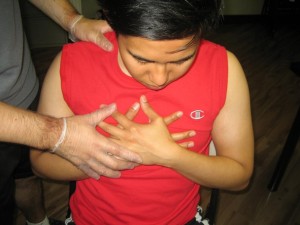Pneumonia is a type of lung infection that has a variety of causes. It can become a critical and dangerous disease.
In most cases, it generally starts with a viral, bacterial or fungal infection. The lungs are swollen and the alveoli within the lungs are filled with fluid.
The condition can affect young and fit individuals, but can be dangerous among the elderly, infants, individuals with other conditions and those who have weakened immune systems.
What are the signs?
The initial signs of pneumonia strikingly resemble the flu or common cold. The usual signs include:
- Fever
- Cough
- Rust-colored or green phlegm
- Shaking chills
- Rapid breathing and shortness of breath
- Rapid heart rate
- Chest pain that is aggravated by deep breathing
- Diarrhea
- Weakness and fatigue
Chest pain that is aggravated by deep breathing. - Nausea and vomiting
- Muscle pain
- Headache
- Sweating
- Confusion especially among the elderly
- Purplish or dusky skin or cyanosis due to poorly oxygenated blood
The signs tend to vary depending on other underlying conditions present and the type of pneumonia.
Management of pneumonia
The treatment for pneumonia is based on the type and seriousness of the condition.
- Antibiotics are generally prescribed if the cause is bacteria.
- The viral forms are managed with adequate rest and increased intake of fluids
- The fungal forms are treated with antifungal medications
Over-the-counter medications might be given to manage the symptoms of pneumonia. These include drugs that lessen the fever, aches and pain as well as suppressing cough. Additionally, it is vital to get enough rest and increase the intake of fluids.

